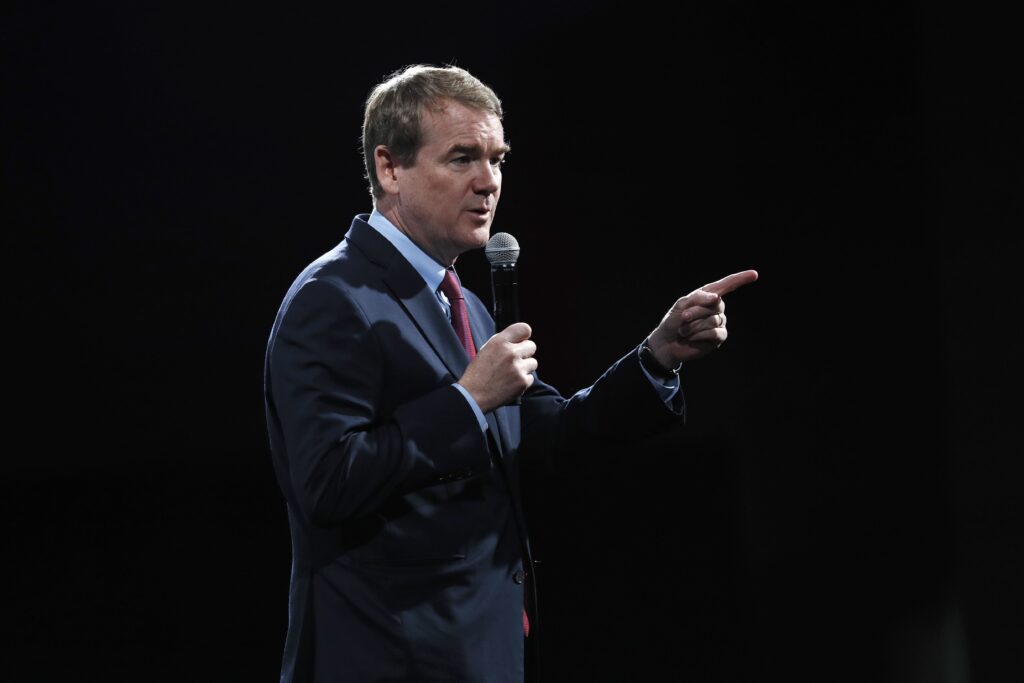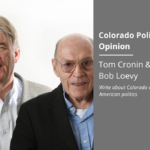Buck’s early exit tees up rare Colorado special election, recalls race to replace Swigert | TRAIL MIX
VGhpcyBTZXB0LiA5LCAyMDExLCBmaWxlIHBob3RvIHNob3dzIGEgc3RhdHVlIG9mIGZvcm1lciBOQVNBIGFzdHJvbmF1dCBKb2huICdKYWNrJyBTd2lnZXJ0LCBKci4sIGF0IHRoZSBDYXBpdG9sIFZpc2l0b3JzIENlbnRlciwgcGFydCBvZiB0aGUgVS5TLiBDYXBpdG9sIGNvbXBsZXggaW4gV2FzaGluZ3Rvbi4gU3dpZ2VydCB3YXMgZWxlY3RlZCB0byBDb25ncmVzcyBpbiBDb2xvcmFkbyBpbiAxOTgyIGJ1dCBkaWVkIGJlZm9yZSBiZWluZyBzd29ybiBpbi4=
KEFQIFBob3RvL0ouIFNjb3R0IEFwcGxld2hpdGUsIEZpbGUp
Colorado is about to do something it’s only done once before in its nearly 148-year history: hold a special election to fill a vacant seat in the U.S. House of Representatives.
On June 25, the same day as Colorado’s primary election, voters in the 4th Congressional District will choose between nominees to complete the term of U.S. Rep. Ken Buck, the Windsor Republican who this week announced his resignation, effective on March 22.
Buck, a former district attorney and chairman of the state Republican Party, has made no secret of his distaste for Washington politics in recent years, routinely breaking with fellow Republicans, while castigating D.C. denizens for pursuing social media status over legislative accomplishments.
Last fall, Buck announced that he isn’t seeking reelection to a sixth term, almost immediately setting off speculation that he would depart Congress before completing his current term at the beginning of next year, but his meticulously timed exit still came as a surprise.
Under Colorado law, Gov. Jared Polis had little choice but to set the special election to pick Buck’s replacement at the same time as the primary. Only two Tuesdays — June 18 and 25 — fit the statuary scheduling requirements, and county clerks will already be mailing ballots to nearly every voter in the district a few weeks before the primary, so slotting a simultaneous special election appeared to be the only option to avoid unnecessary expense and voter confusion.
Not that there won’t be plenty of the latter.
Although details have yet to be finalized, every voter formerly represented by Buck will get a special election ballot listing a Republican, a Democrat, and any third-party or independent candidates who qualify for the special election in the 4th CD, a heavily Republican seat dominated by suburban Douglas and parts of Larimer counties and sprawls across the Eastern Plains. That ballot will be to elect someone to serve the roughly six months remaining in Buck’s term, until the next Congress is sworn in on Jan. 3, 2025.
At the same time, another ballot — it could be printed on the same sheet of paper or it could be on a separate sheet — will ask Democrats to vote in their party’s primary and Republicans to vote in theirs, while unaffiliated voters will get both a Democratic and Republican ballot but can only fill out and return one of them. The primary ballots will also include candidates for Buck’s seat, only they’ll be running for the two-year term that begins next year.
Will voters pick one candidate to finish Buck’s term and another as their party’s nominee to run in November to succeed their first pick?
That’s the question consuming politicians across the board as Democrats and Republicans prepare to designate their candidates for the special election, and more than a dozen primary candidates from both parties who had been aiming toward the primary before Buck dropped his bombshell announcement.
The special election ballot will be set by April 1, the deadline for the parties to pick nominees, and the primary ballot should be finalized by mid-April, depending on how many candidates turn in petitions to qualify.
A U.S. representative’s seat is the only federal or state office in Colorado filled by special election when a vacancy occurs. If a governor resigns or dies in office, the lieutenant governor takes over, and the governor appoints replacement U.S. senators and other statewide executive officials if their seats open up. State legislative vacancies, meanwhile, are filled by party vacancy committees that name lawmakers to serve until the next general election, in a process that has drawn increased scrutiny in recent years.
While it’s been just over 50 years since a lieutenant governor replaced a governor — in 1973, Republican John Vanderhoof stepped up when Gov. John Love resigned to join President Nixon’s cabinet as the nation’s short-lived energy czar — but the other offices have become vacant and been filled more recently.
In early 2009, Gov. Bill Ritter made two vacancy appointments, naming fellow Democrat Michael Bennet to complete U.S. Sen. Ken Salazar’s term after Salazar resigned to become interior secretary in the Obama administration, and tapping Democrat Bernie Buescher to replace Republican Mike Coffman as secretary of state after Coffman won election to represent the 6th Congressional District.
Before that, Republican Gov. Bill Owens in 2005 appointed John Suthers to finish Salazar’s term as attorney general after Salazar was elected to the U.S. Senate, and more recently, Democratic Gov. John Hickenlooper designated Donna Lynn as his lieutenant governor in 2016 after Joe Garcia stepped down to head an interstate higher education commission.
The June 25 election to complete Buck’s term will be the eighth special election held nationwide since the 118th Congress convened in January 2023 — six, including the one to replace Buck, after the members resigned, one because a recently reelected member died weeks after his election, and one to fill the vacancy created late last year when New York Republican George Santos was expelled.
While special elections to fill vacant U.S. House seats are fairly common — averaging half a dozen a year since 2000 — there’s only been one held in Colorado since statehood, in 1983, to fill the vacancy created in a new congressional district when the winner in the general election died just days before he would have taken office.
After Colorado gained a House seat in 1982, Republican Jack Swigert, the astronaut who piloted 1970’s troubled Apollo 13 mission, was elected to represent the new, GOP-leaning 6th Congressional District, a U-shaped seat that covered Denver’s western, southern and eastern suburbs.
“Hey, we’ve got a problem here,” said Swigert when an oxygen tank on the Apollo craft exploded, setting off a tense three days as the world held its collective breath, while NASA altered the planned moon landing and determined how to bring Swigert and his two fellow crewmen, James A. Lovell and Fred W. Haise, safely home.
Swigert — portrayed by Kevin Bacon in the 1995 drama “Apollo 13” — successfully navigated the craft around the dark side of the moon, cruising a precise 164 miles above its surface, and back toward Earth.
A few years after landing, Swigert became executive director of the House’s Committee on Science and Technology and then returned to his native Colorado, where he ran for the U.S. Senate in 1978 but lost the GOP primary to then-U.S. Rep. Bill Armstrong, who unseated Democrat Floyd Haskell in the fall election.
Four years later, Swigert won the Republican nomination for the new congressional seat and easily defeated Democrat Steve Hogan, a member of the Aurora City Council and former state lawmaker.
Swigert revealed during the campaign that he’d been diagnosed with cancer, but although his doctors believed they had successfully treated a tumor that summer, an aggressive bone-marrow cancer returned months before the November election, and his condition deteriorated rapidly after he won. Swigert died at age 51 on Dec. 27, 1982, a week before his scheduled swearing-in, with his friend and one-time political rival Armstrong at his side.
A graduate of Denver’s East High School and the University of Colorado in Boulder, the Presidential Medal of Freedom winner is memorialized in bronze, one of two Coloradans honored with a statue at the U.S. Capitol’s Statuary Hall.
Democratic Gov. Dick Lamm — who later described Swigert as “a genuine home-grown hero for a whole generation of Colorado kids” and won his third term the same night Swigert was elected — set a special election for March 29, 1983, giving the major parties until Jan. 29 to come up with nominees.
With little guidance in party bylaws, Republicans decided to call a convention in mid-January, consisting of the 632 delegates who had convened the previous summer at the GOP’s 6th District assembly. At the end of several rounds of voting, state Sen. Dan Schaefer, R-Lakewood, emerged as the party’s special election nominee.
After initially protesting that national Democrats had already written off the seat — and stinging over the $23,000 debt he still carried from the previous year’s campaign — Hogan became his party’s nominee by acclamation at a convention held later in January.
Although Schaefer raised $200,000 to Hogan’s $50,000, observers gave the Democrat a chance in the lower-turnout special election, and the Denver Post went from endorsing Swigert in the earlier campaign to supporting Hogan as the candidate with the “potential to carry on with Swigert’s vision.”
What’s more, even though Republicans held a voter registration advantage, the district had split the ticket months earlier, giving Lamm, the Democrat, 67% of the vote, while electing the Republican Swigert with 62% of the vote.
But on election night, even though the turnout was just under half the number of voters who cast ballots in the general election, the results were almost exactly the same: Schaefer won with 63%, Hogan took 35% and perennial independent candidate John Heckman trailed with a couple of points.
Schafer, who died in 2006, easily won reelection to seven full terms before retiring from Congress in 1998. After serving six non-consecutive terms on Aurora’s city council, Hogan was elected mayor of the city three times and died in office in 2018.












